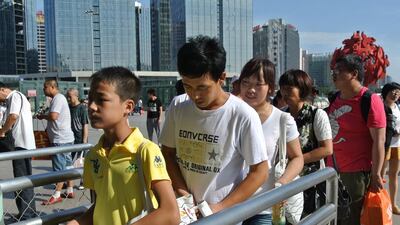BEIJING // Standing in a crowded waiting room at Beijing West Railway Station, 14-year-old Du Shuangyan’s is trying his best to choke back the tears.
Thanks to the work of a Beijing-based charity he has, for the past three weeks, been able to live in the same city as his parents and to indulge in childish pursuits.
He knows that when he pulls in to his mountain village in the western province of Gansu in less than 24 hours all that will change.
Shuangyan is a “liushou ertong” or a “left-behind child” — one of an estimated 60 million, mainly rural children who are raised by relatives, strangers or even left to fend for themselves because their parents have had to go to the cities in search of better paid work.
In Shuangyan’s case, he shares the care of his younger brother and sister with his grandmother, as well as looking after himself.
“In the future I want us to all to be able to live together in Beijing,” he says, his face burning with anger and sadness at his immanent separation from his parents and their decision to stay in, what he sees as a convenient, fun-filled city.
“Life is so difficult in our village.”
Though China has undergone an unparalleled social and economic transformation in the past 30 years — it has jumped from the world’s 9th largest economy in 1980 to the second largest today — there are still many parts of the Communist-led country, such as the Du’s home county in Gansu, where people live much the same way they did before the reforms took hold.
Adults in those areas have a difficult choice: wait for the development to come to them or leaving their families behind and going out in search out of the opportunities themselves.
“The only work is farming and we do not have machines or a good climate. Almost all the parents in our village are gone,” says Du Gehong, Shuangyan’s father.
“It’s a heartbreaking decision to leave your children behind but we have to in order to provide for them.”
Mr Du and his wife can earn 50,000 yuan (Dh30,000) a year working in Beijing, compared to 10,000 yuan a year from farming back home.
But they can only earn that money if they don’t bring their children with them. They live in separate dormitories near their respective places of work — Mr Du works on a construction site, his mother in a restaurant making dumplings — and they save all their days off for an annual trip home.
During the year family stay in touch with their children by short calls on their mobile phones, just long enough to check there are no emergencies and that everyone is well.
“We don’t want them to feel like that they are growing up without parents,” Shuangyan’s mother, Chen Qianying, says. The only reason for this sacrifice, she says, is to provide their children with the life and education that they never had.
Yet both parents know they are taking a risk. They have noticed that Shuangyan’s confidence and academic record have taken a hit since they left three years ago and they say he often finds it hard to cope with all the domestic responsibilities he has been given.
There are other dangers too. A spate of stories in the Chinese media have suggested that left-behind kids more susceptible to bullying, sexual and physical abuse, and domestic accidents, such as burns, if they are living alone or with an elderly relative.
While a government report on left-behind children this year said that as much as 20 per cent of the 60 million children classified as left behind were separated from their parents before age 1.
“Such parental absence is taking terrible toll on these children lives,” the report said.
Other experts agree.
“Because those left-behind children are not loved during their childhood. They will find it hard to love others later. They may also develop a sense of inferiority which will affect them later in life,” says Tu Jiaheng, who works for the Beijing Western Sunshine Rural Development, an organisation which, among other things, brings left-behind children on holiday to Beijing during the summer.
Mr Tu was responsible for Shuangyan’s care this summer and he noticed how emotionally fragile the boy had become. As a result Shuangyan’s mother is thinking of returning home for good.
“If his studies get any worse one of us will have to go,” says Ms Chen. “After all, we are doing this for the children. If they are suffering, what’s the point?”
foreign.desk@thenational.ae

